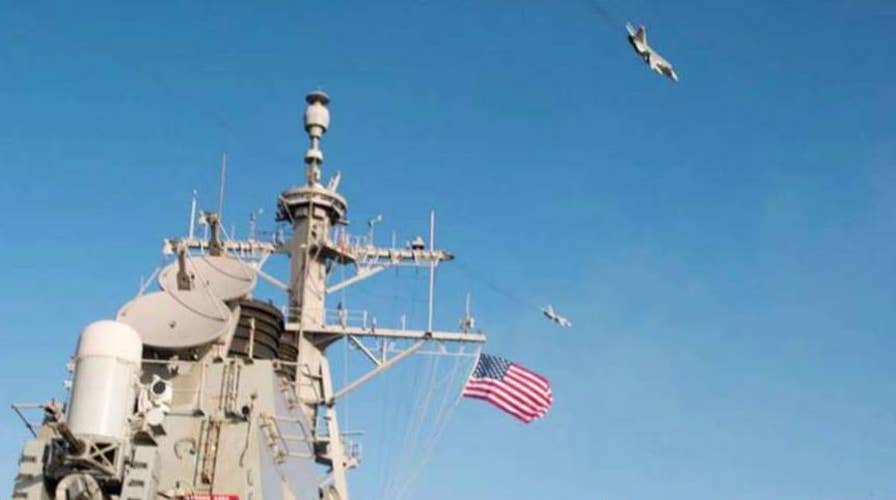Russia 'does not understand' US reaction to plane flyby
US officials blast stunt as 'unsafe and unprofessional'
Secretary of State John Kerry said Thursday the U.S. Navy ship that was buzzed by two Russian warplanes in the Baltic Sea this week could have opened fire under U.S. military rules of engagement.
The USS Donald Cook (DDG-75) was conducting flight operations with a Polish helicopter Monday when two Russian Su-24 attack aircraft came within 1,000 yards of the destroyer, flying just 100 feet off the ground. The following day, a Russian jet came within 30 feet of the destroyer.
A U.S. defense official described the maneuvers to Fox News as a "simulated attack profile."
"We condemn this kind of behavior. It is reckless. It is provocative. It is dangerous. And under the rules of engagement that could have been a shoot-down," Kerry told CNN Espanol in Miami Thursday.
In all cases, a military commander has the authority to defend his or her ship, plane or other unit. The commander is expected to use his or her best judgment under the circumstances to determine whether the ship faces an imminent threat.
"People need to understand that this is serious business and the United States is not going to be intimidated on the high seas," Kerry added. "We are communicating to the Russians how dangerous this is and our hope is that this will never be repeated."
The planes appeared to be unarmed. At the time of the incidents, the Cook was in international waters about 70 nautical miles from the Russian enclave of Kaliningrad, which hosts Russian military forces.
The Cook did not respond except to unsuccessfully query the Russian pilots by radio.
Russian defense officials rejected U.S. criticism of the incident. A spokesman for the Russian defense ministry said earlier Thursday that the pilots of the Su-24 jets saw the ship and turned back “while using all measures of precaution.”
Maj. Gen. Igor Konashenkov said he was baffled by what he described as the "distressed reaction of our American counterparts."
The U.S. European Command statement said Wednesday that officials are using diplomatic channels to address the matter.
"We have deep concerns about the unsafe and unprofessional Russian flight maneuvers," European Command said in its written statement. "These actions have the potential to unnecessarily escalate tensions between countries, and could result in a miscalculation or accident that could cause serious injury or death."
"It may have been in international waters and therefore may not be any violation of international law, but it is still irresponsible behavior," NATO Deputy Secretary General Alexander Vershbow, a former US ambassador to Russia, told the Associated Press. "It illustrates that Russia is contributing to tensions."
It was unclear when or if the U.S. government would formally protest the Russian actions, which come at a time of tensions between Washington and Moscow over Russia's annexation of Crimea, its military intervention in eastern Ukraine and fears among former Soviet states in eastern Europe that Russian aggression could threaten their independence.
White House press secretary Josh Earnest said the incident was part of a pattern of unsafe Russian aircraft action.
"This incident ... is entirely inconsistent with the professional norms of militaries operating in proximity to each other in international waters and international airspace," Earnest said.
"There have been repeated incidents over the last year where the Russian military, including Russian military aircraft, have come close enough to each other or have come close enough to other air and sea traffic to raise serious safety concerns. We continue to be concerned about this behavior," he said.
The U.S. believes the Russian actions may have violated a 1970s agreement meant to prevent unsafe incidents at sea. The agreement was between the U.S. and the former Soviet Union but remains in force with Russia.
Russian jets buzzed the USS Donald Cook in the Black Sea in similarly provocative fashion in April 2014. More recently, a Russian fighter jet intercepted a U.S. Air Force spy plane over the Black Sea in January.
Fox News' Lucas Tomlinson, Jennifer Griffin and The Associated Press contributed to this report.









































